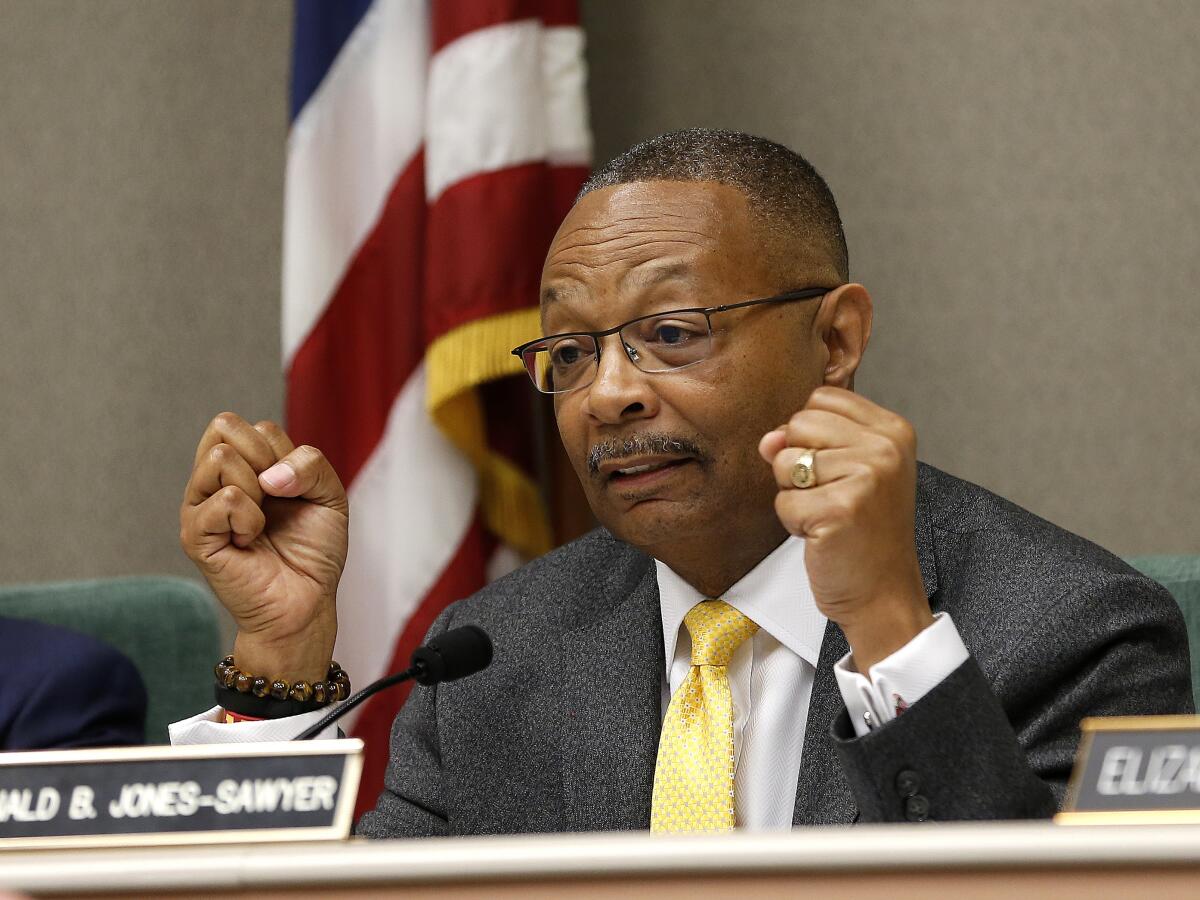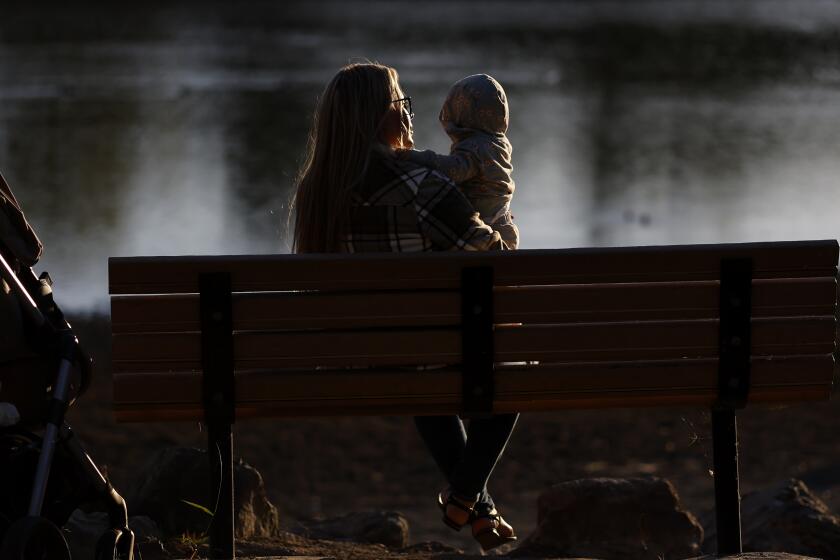Support pedophiles or protect children? A false question roils California Legislature

- Share via
SACRAMENTO — Do you support protecting pedophiles or protecting kids?
Seems like a bit of a no-brainer, but that’s the level of debate that the California Legislature stooped to this week as it brawled over a bill that would increase criminal penalties for the sex trafficking of minors.
By the logic that dominated the Capitol in recent days, I would have fallen in the camp that is allegedly protecting pedophiles.
Now, in case you need to hear it, I do not support pedophiles or sex traffickers.
But I also do not support new laws with old problems, and I don’t support smashing discussion under the boot of conservative oversimplification.
The bill in question is Senate Bill 14, by Republican Shannon Grove, who represents a swath of the Central Valley that stretches roughly from Fresno to Bakersfield and into the desert.
The bill would make sex trafficking of a minor a serious felony, a California designation that makes it eligible for our “three strikes” law — meaning 25 years to life when you hit that third qualifying crime. Sounds more than reasonable for selling a child for sex. It sounds good.
But the devil is always in the details, and Grove’s proposal raised two major concerns for those who have made criminal justice reform a priority, chief among them Assemblymember Reggie Jones-Sawyer (D-Los Angeles).
Jones-Sawyer runs the influential public safety committee in the Assembly, and, though the bill passed through the Senate unanimously (but with many changes to make it more narrow), he flagged it during a hearing this week, basically preventing it from moving forward.
From Jennifer Siebel Newsom to a case you never heard of, misogyny thrives in our justice system. Why do we keep punishing victims?
Chaos ensued, with some of the bill’s supporters accusing him and others who opposed it of protecting pedophiles — that cultural firebomb meant to stop all dissent.
The leaders of the Freedom Angels, who came to fame a few years ago with their opposition to vaccines and the later attempted recall of Gov. Gavin Newsom, went on the attack — as did numerous people who believe in Qanon-related conspiracy theories that Democrats and “elites” traffic children.
Threats, including death threats and people hoping that legislators’ children will be kidnapped and raped, have flooded the phones and emails of Jones-Sawyer and other legislators who failed to vote in favor of the bill.
Grove, whom I spoke with Thursday, was clear she condones none of those tactics “in any way, shape or form.”
She points out that threatening a public official is a crime in California, and though her colleagues may disagree, she is all for turning those threats over to law enforcement for investigation.
But that pressure had its effect. After Republicans threatened to force a floor vote on the bill, Assembly Democrats (who have a new leader, Robert Rivas of Hollister, which means they are still figuring out how to play nice with each other) sent it back to Jones-Sawyer’s committee to save face. This time, it passed in a tense two-minute session in which two influential Democrats quickly exited after declining to vote and one Republican threw his fist in the air in victory.
What comes next is uncertain, but we need to look at the concerns Jones-Sawyer and others raised. Because having concerns, even if the Senate passed the bill, is legitimate and the kind of nuanced scrutiny we should expect from our elected officials.
A big issue is that the bill carries the potential — slim, but there — that prosecutors could charge victims of sex trafficking with a serious felony, locking them up for decades.
Sometimes, as I’ve written about before, women and children who are trafficked, subjected to horrible abuse and fear, cooperate with their traffickers. At times, this can include helping the trafficker control other victims. It is almost always a means of survival, and a coerced one at that.
Grove acknowledges this.
“This is like slavery,” she told me. “The trafficker controls their every move.”
Kieana Aldrich was 17 when sent to prison. Her mental health has deteriorated behind bars, but the coronavirus has cut off nearly all help.
But women have been convicted of trafficking charges because of that cooperation, and Jones-Sawyer and others are worried that the bill leaves open the possibility that it can continue to happen — despite changes made to the bill in the Senate meant to address the problem. The fate of victims is mostly left to the discretion of prosecutors, and most prosecutors have become more informed in recent years as California has switched from viewing sex trafficking victims as willing “prostitutes” regardless of age, to people worth protecting. But you never know when that discretion will turn ugly.
“Normally with these tough-on-crime laws, they have kind of a shotgun effect where they go out and arrest everybody,” Jones-Sawyer told me. “Then they ensnare some innocent people. It’s really important that we don’t criminalize these victims.”
There is also concern about creating more problems in the already-problematic three-strikes law. Many who support criminal justice reform would like to see the 1994 law, which came about in the middle of our failed war on drugs, taken off the books.
Three strikes has been instrumental in the over-incarceration of Black and brown people. Black people make up 6% of California’s population but are about “30% of the state’s prison population, 25% of the jail population, and 26% of the probation population,” according to the 2021 report by the Committee on Revision of the Penal Code.
Do I care what race a child sex trafficker is? No. But many of the crimes that earned strikes for people have nothing to do with trafficking and can seem pretty minor. Vanessa Russell, the founding executive director of Love Never Fails, an advocacy and aid organization for survivors of trafficking, points out that stealing a purse while riding a bus is a strike-worthy offense. For that reason, she at first opposed Senate Bill 14, not wanting to combine those lesser crimes with trafficking.
“The [three-strikes] list is flawed absolutely, and that’s why I had a problem with it,” she told me.
She supports the bill now because, like all of us, she wants children protected and feels some of her concerns have been addressed. But she said she wished Senate Bill 14 had stayed away from three strikes and instead made sex trafficking a stand-alone offense that requires longer sentences with no chance of getting out early for things like good behavior credits.
“Why can’t we just create different language that says trafficking a minor, you have to serve 80% of your time, period?”
Good question. Let’s ask it.
But the biggest reason that Senate Bill 14 deserves more discussion is because it doesn’t directly help victims. California has made tremendous progress in recent years to center its response to human trafficking around stopping it before it starts and helping victims to find meaningful escapes that allow them to heal and move forward.
This bill may keep victims safer by keeping pimps locked up, but there will always be more pimps. The bill lacks that California focus on centering victims and reducing trafficking by reducing the number of women and children that are available to be preyed upon — and protecting those that have already been victimized.
For example, it could address the fact that women remain incarcerated for crimes related to their trafficking. How about we provide a mechanism for those cases to be reexamined? Why do we not adequately fund programs that help women become housed and economically stable when they do escape? Why can’t we ensure that the threat of prosecution will not be used to force victims to testify, as it too often is?
“It’s good to have penalties for those that traffic children, but it’s equally important to focus on the needs of the survivors,” Maggy Krell told me.
Krell is a prosecutor who has specialized in human trafficking and put her share of pimps behind bars. She is running for an Assembly seat to represent parts of Sacramento, and supports Senate Bill 14. But she also says that focus on helping victims is critical.
“The bills that I will be pushing if I’m successful in my race will be bills centered around the needs of survivors, not defendants,” she told me. Bills to provide investments in underserved communities, bills to take away barriers to healthcare and housing for victims, bills to help victims recover from trauma.
Which means she’ll likely be joining legislators such as Jones-Sawyer, who, as he puts it, wants to get “monsters” off the street while also getting to the root causes of human trafficking.
Because, yes, trafficking a minor should be a serious felony.
But stopping human trafficking should also be a serious discussion, not one stifled by frenzy and intimidation.
More to Read
Sign up for Essential California
The most important California stories and recommendations in your inbox every morning.
You may occasionally receive promotional content from the Los Angeles Times.















